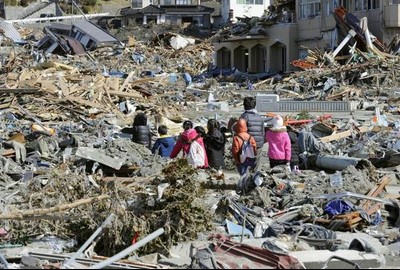Nov 2017
Disaster is inevitable in Japan, but paralysis is not
Many years ago, I ran across a humorous coat of arms that showed spilled milk and ink, jammed gears with monkey wrenches, tangled coat hangers and a broken pencil. I made a copy that still decorates my home as my appropriated coat of arms. At the bottom is a scroll with the Latin inscription, Calamitas Necessaria Est (disaster is inevitable).
That could be the motto of Japan.
The ward of Tokyo in which I live distributed to all of us residents a book, the title of which translated into English is Not If, When. It is about disaster preparedness.
With volcanoes, earthquakes, tsunamis and typhoons, along with the usual sorts of disasters like fires, floods and landslides, Japan is, indeed, a place where we do not think and speak of the possibility of calamity. We prepare for its unpredictable but inevitable occurrence.
Japan’s history of sudden destruction has played a key role in the development of Japanese culture. There are two phrases that come out of that history that provide lenses through which to look at Japan today.
The first is shikata ga nai. Shikata means a way to do something. Nai means “is not.” (Ga is a grammatical marker.) In other words, nothing can be done. There is no way to prevent an earthquake, tsunami, volcanic eruption or typhoon.
As the frighteningly erratic leaders in North Korea and the United States rattle nuclear sabers at one another with Japan in between them, the country is facing yet another situation that is not amenable to its control. Friends from outside Japan have asked me how the Japanese (or, for that matter, I) deal with that.
A system to alert citizens to missiles headed into, or through, Japanese airspace and “duck-and-cover” drills have been introduced in some parts of the country. But, generally speaking, people are not allowing the situation to affect their lives. Why waste energy worrying about something over which we have no control? Shikata ga nai.
It is easy to imagine that such an attitude could lead to communal paralysis or resigned fatalism: nothing can be done, so let’s just resign ourselves to the inevitable. It might also lead to a sybaritic “eat, drink and be merry, for tomorrow we die” attitude.
However, that is not the case in Japan.
During the night of March 9-10, 1945, more people were killed by an incendiary bombing raid on Tokyo than in either Hiroshima or Nagasaki and, perhaps, more than in those two atomic attacks combined. Going to the internet and looking at photos of Tokyo in 1945, it is hard to imagine, though we have seen it ourselves, that the devastated city would, in 30 years, be the capital of the number two economic power in the world.
Part of that “miracle” is in the word that follows the disastrous: ganbar?h. The “?” ending on a vowel means, “together let’s”…” Ganbar?h means, “let’s get to work!”
People who contacted me from other countries following the 2011 earthquake and tsunami in northeastern Japan that took some 17,000 lives, left hundreds of thousands homeless and caused the explosion of a nuclear power plant expressed surprise that there were no reports of looting, rioting or other forms of social unrest. One friend said he was “bowled over” when, on a news report, he saw an elderly woman in a relief centre who reached the head of the line just as the supply of food ran out. She simply bowed and walked away. No complaints, no histrionics.
Those of us who know the Japanese and the spirit of ganbar?h were not surprised. That spirit is marked by unity, focused activity, cooperation, diligence, unselfishness and good manners.
It was that spirit of cooperative action that enabled Japan to make a better, quicker and fuller recovery from the destruction and defeat of World War II than did some of the victors.
That example may not be of much use to other countries. Cultures do not change quickly, not because another culture looks good from afar. It probably took centuries of experience for Japan’s culture to adapt to its disasters.
However, what is not possible for whole cultures is possible to people who live in them. It is possible for individuals from other cultures to learn something from the Japanese attitudes of shikata ga nai and ganbar?h. I hope I have. Instead of fruitless fretting over that which we cannot control, we could develop the ability to work with others unselfishly and effectively.
In fact, Jesus may have recommended some degree of shikata ga nai when he said, “do not worry about tomorrow, for tomorrow will bring worries of its own.”
We, who claim to believe that nothing “will be able to separate us from the love of God” should be especially willing to spend our energy on preparing ourselves to serve after disasters small or large, social or personal rather than obsessing about their inevitability.
Article reproduced from Herald Malaysia online


